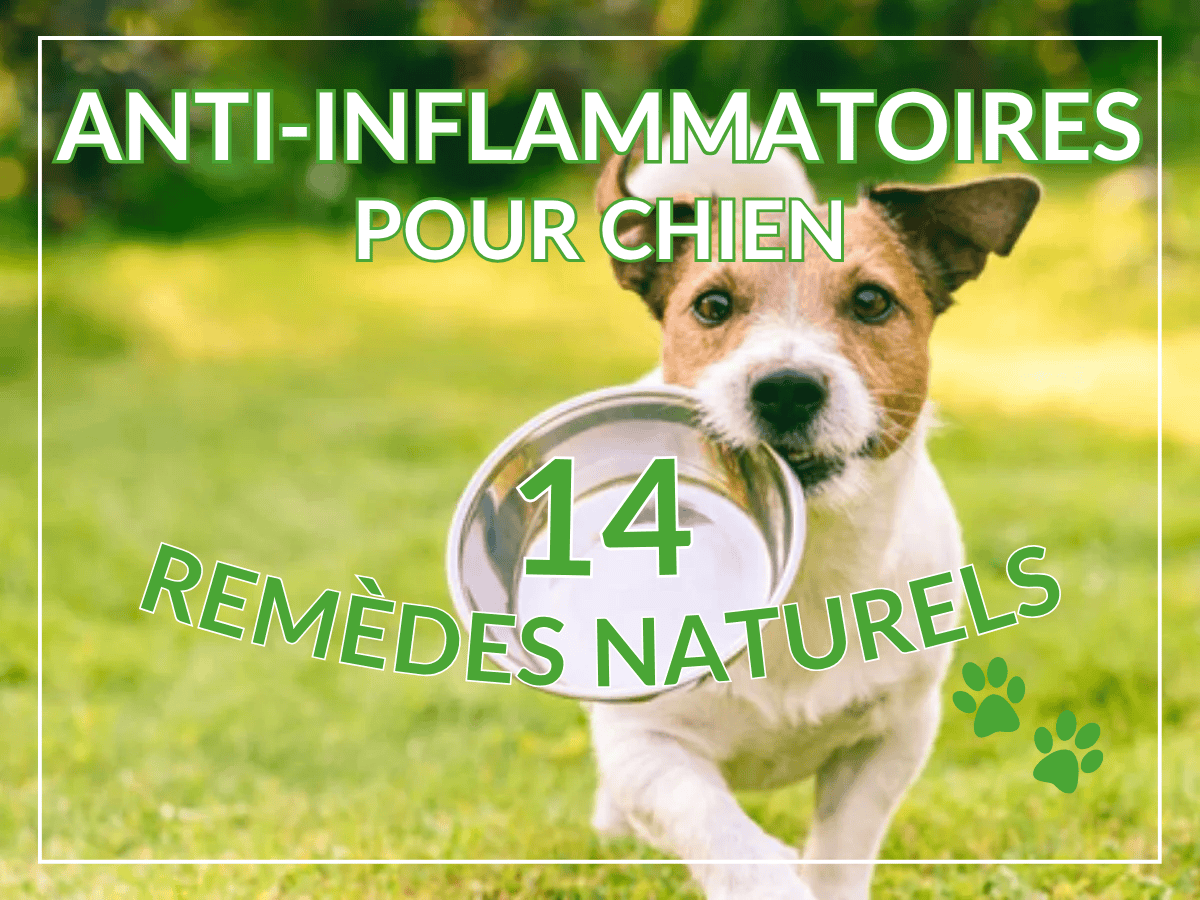
The 14 Best All-Natural Anti-Inflammatories for Dogs
You might not realize it, but there are plenty of natural anti-inflammatories for dogs you can easily use to help soothe discomfort and pain linked to inflammation.
Surprisingly, many of these remedies could already be sitting in your kitchen or growing in your garden!
With over a decade of experience in holistic pet care, at HomeoAnimo we’re dedicated to sharing high-quality, 100% natural products designed to strengthen your dog’s immune system and support their overall well-being.
In this article, we’ll share key insights from our research and introduce you to the top natural anti-inflammatories for dogs. And remember, our range of natural products are here to support you and your furry companion on their health journey!
Let’s start by exploring what inflammation actually is in dogs.
What Is Inflammation in Dogs?
Simply put, inflammation in dogs is the immune system’s natural reaction to invaders or injuries. This can include bacteria, viruses, foreign objects, or damaged tissues.
When the immune system senses a threat, it launches a chain of responses: blood vessels expand, and white blood cells—the body’s natural defenders—flood the affected area to fight off the problem and begin the healing process.
How Does Inflammation Appear in Dogs?
Inflammation in dogs often presents with visible signs you can recognize:
- Pain: The area feels tender when touched, and your dog may whimper or react differently.
- Swelling: Noticeable puffiness around the injured or infected site.
- Heat: The skin over the inflamed area feels warmer than usual.
- Redness: Often visible on the skin or mucous membranes.
- Loss of function: Depending on the severity and location, your dog may struggle to move or bear weight.
These symptoms can be very uncomfortable. That’s why it’s essential to be aware of the natural anti-inflammatories available to help ease pain and improve your dog’s well-being quickly.
What Are the Main Causes of Inflammation in Dogs?

Inflammation is a complex process triggered by many different factors. Here are six (6) common causes of inflammation in dogs:
- Injuries: The most frequent cause. Whether it’s a cut, sprain, burn, or splinter, the body dispatches white blood cells to clean the area and start tissue repair.
- Infections: Inflammation acts as the immune system’s response to fight pathogens (bacteria, viruses, fungi) and repair damage. In many cases, inflammation is an early sign of infection.
- Genetics and Aging: Some dogs are genetically prone to inflammation. As they age, their immune systems can weaken, making them more likely to develop chronic inflammatory issues, especially in the joints like arthritis.
- Environmental Factors: Exposure to pollution, allergens (like pollen or dust mites), or irritating chemicals (cleaning products, pesticides) can lead to skin or respiratory inflammation.
- Food Allergies: When the immune system identifies certain ingredients (such as chicken, beef, or grains) as threats, it reacts with inflammation. This can show up as skin problems (itchiness, redness), digestive troubles (diarrhea, vomiting), or joint pain.
- Metabolic Disorders: Conditions like diabetes, obesity, or certain hormonal imbalances can trigger systemic inflammation. If unmanaged, this chronic inflammation can cause more serious complications, including heart issues.
How Can You Recognize Inflammation Symptoms in Your Dog?

Watch for these common signs that may indicate your dog is dealing with inflammation:
- Constant licking or chewing of one spot: This often points to irritation or localized pain.
- Swelling: Especially noticeable around joints (ankles, shoulders, elbows), but it can occur anywhere.
- Sudden mood changes: Unexplained irritability, aggression, or lethargy.
- Fatigue or lack of playfulness: Less active, more sleeping, less engaged.
- Stiffness or limping: Trouble standing up, going upstairs, running, or jumping.
- Loss of appetite: A general sign of discomfort.
- Fever: Elevated body temperature often accompanies inflammation.
Let’s go over the natural anti-inflammatories you can use to help address these problems…
The Best Natural Anti-Inflammatories for Dogs: What Can You Use?

You may be surprised by how many natural remedies can help when your dog is dealing with inflammation.
Here is a detailed list of natural anti-inflammatories you can use to help your dog feel better:
1. Dried Comfrey
According to the National Center for Biotechnology Information (NCBI), comfrey contains moderate amounts of rosmarinic acid, known for its anti-inflammatory properties.
Rosmarinic acid helps prevent the formation of malondialdehyde, a compound linked to oxidative stress and inflammation.
- How to use: Mix dried comfrey powder with a bit of water to form a thick paste. Apply directly to the affected area and cover with gauze. Leave it for a few hours, then replace as needed.
- Precautions: For external use only. Do not let your dog lick the paste.
2. Hawthorn Berries
According to a study published in ACS Publications, hawthorn berries are rich in phenolic compounds with anti-inflammatory and antimicrobial benefits. These compounds can also help protect the digestive system.
- How to use: To use hawthorn berries as a natural anti-inflammatory, gently crush the berries to release their juice and apply it topically like an ointment. You can also create a poultice combining crushed leaves and berries.
- Precautions: If your dog is taking heart or blood pressure medications, hawthorn can lower blood pressure further. Always consult your vet before giving internally.
3. Cayenne Pepper
Mount Sinai notes that cayenne pepper contains an active compound called capsaicin. Capsaicin helps decrease levels of substance P, a neurotransmitter involved in pain perception. When substance P is reduced, pain signals are diminished.
- How to use: Mix a small amount of cayenne powder with vegetable or sunflower oil to create a paste. Gently massage it over the affected area.
- Precautions: Extremely irritating to the eyes, nose, and mouth. Never apply on open wounds. Always test on a small area first.
4. Spirulina
The National Center for Biotechnology Information (NCBI) highlights that spirulina, a blue-green algae, is packed with an antioxidant called phycocyanin. This compound helps neutralize free radicals that fuel and prolong inflammation.
Spirulina also provides beneficial fatty acids, including omega-3 and omega-6, which support anti-inflammatory processes.
- How to use: Sprinkle a small pinch of spirulina powder over your dog’s meals or mix into their drinking water.
- Benefits: Supports immune health and overall vitality.
5. Fatty Fish
According to the Harvard Medical School, fish oil—found abundantly in fatty fish like mackerel, anchovies, herring, trout, tuna, and salmon—contains alpha-linolenic acid (ALA), docosahexaenoic acid (DHA), and eicosapentaenoic acid (EPA). These nutrients help counteract inflammation.
- How to use: To harness the natural anti-inflammatory benefits, include cooked, boneless, unseasoned fatty fish like mackerel, herring, or salmon in your dog’s diet. Fish oil supplements are also an excellent option.
- Benefits: Supports joint health, skin, coat, and cognitive function.
6. Turmeric Powder
The National Center for Biotechnology Information (NCBI) reports that turmeric contains curcumin, a compound that interrupts pain-signaling molecules in the body. Curcumin is also known for its antioxidant and anti-inflammatory qualities.
- How to use: Add a small amount (a few pinches) of turmeric powder to your dog’s water or meals. For better absorption, combine it with black pepper and a healthy fat.
- Precautions: Excess can taste too strong. Always consult your vet if your dog has specific health conditions.
7. Yucca Root and Bark
A study by the National Center for Biotechnology Information (NCBI) reveals yucca is rich in polyphenols like resveratrol, which can help suppress the production of nitric oxide—a known inflammatory molecule.
- How to use: To apply yucca as a natural anti-inflammatory, crush the root and bark into a thick paste. Spread it over the affected area and cover it securely with gauze to prevent licking.
- Precautions: For external use only. Do not allow your dog to ingest it.
8. Cinnamon Powder
The National Center for Biotechnology Information (NCBI) states that cinnamic acid in cinnamon contains several compounds that inhibit nitric oxide production in the body. Nitric oxide is a driver of inflammation.
- How to use: Mix about a teaspoon of cinnamon powder with water (and optionally a bit of vegetable oil) to create a paste. Gently apply to the inflamed area and wrap with gauze.
- Precautions: Use sparingly if given internally. Ceylon cinnamon is preferred due to lower coumarin content.
9. Ginger
According to research published by the National Center for Biotechnology Information (NCBI), ginger contains active compounds like shogaol and gingerol. These compounds are known to reduce cytokines and nitric oxide, both involved in inflammation.
- How to use: Crush a thumb-sized piece of fresh ginger in a mortar and pestle to release its juice. Apply this juice directly to the affected area, covering with gauze.
You can also add a small amount of freshly grated ginger to meals. Specialized dog-safe extracts and powders are available. - Precautions: Avoid overuse, as too much can cause digestive upset.
10. Dried Meadowsweet (Spiraea ulmaria)
According to the Pharmaceutical Journal, meadowsweet contains significant amounts of salicylic compounds with anti-inflammatory action.
Did you know?
It’s interesting to note that Felix Hoffmann, who discovered acetylsalicylic acid, used meadowsweet extracts to develop the active ingredient that became aspirin.
- How to use: Steep dried meadowsweet leaves and flowers in hot water for at least 10 minutes to activate the salicylic compounds. Let it cool completely, then give your dog about one teaspoon of the infusion daily until the inflammation subsides.
- Precautions: Not recommended for dogs allergic to anticoagulants or salicylates, pregnant females, or dogs with bleeding disorders or kidney issues. Always consult your vet before use.
11. Devil’s Claw (Harpagophytum) Roots and Tubers
ScienceDirect reports that devil’s claw contains terpenoids, acetylated phenolic glycosides, and iridoid glycosides, all known for their anti-inflammatory benefits.
- How to use: Crush the roots and tubers into a paste and apply as a topical poultice on the affected area, securing it with gauze. Reapply as it dries.
Oral supplements formulated specifically for dogs are also available. - Precautions: Not advised for pregnant dogs or those with ulcers, gallstones, diabetes, or heart issues. Always use under veterinary supervision.
12. Boswellia Serrata Bark
The National Center for Biotechnology Information (NCBI) notes that Boswellia serrata, also called Indian frankincense, contains triterpenic acids, triterpenes, diterpenes, and monoterpenes that help block enzymes responsible for inflammation.
- How to use: Continuously crush Boswellia bark until fibers are exposed. Gently rub the fibers over the inflamed area, then cover with gauze to stop licking.
Standardized boswellic acid extracts are also available in oral supplement form. - Precautions: Excess ingestion may cause gas or diarrhea. Follow recommended dosages carefully.
13. Alfalfa
The National Center for Biotechnology Information (NCBI) states that the aerial parts of alfalfa contain fatty acids and cinnamic acid derivatives, which help ease pain and discomfort caused by inflammation.
- How to use: To harness alfalfa’s benefits as a natural anti-inflammatory for dogs, use a food processor to grind it as finely as possible into a thick paste. Gently massage this paste over the affected area.
Another option is to sprinkle a very small amount (about one teaspoon) directly into your dog’s food. Be sure to use moderation.
- Precautions: Large quantities are not recommended due to alfalfa’s saponin and coumarin content.
14. Arnica montana (Mountain Arnica)
According to the National Center for Biotechnology Information (NCBI), Arnica montana is rich in phenolic acids, flavonoids, and sesquiterpene lactones, all known for their anti-inflammatory properties. This plant has also been shown to help with bruising, swelling, and post-traumatic pain.
- How to use: Crush the flowers into a soft pulp and apply directly to the inflamed area. Cover with gauze to keep it in place. Reapply when the mixture dries out.
- Precautions: For external use only. Ingestion can be toxic.
What Are the Types of Inflammation in Dogs?

In dogs, the term “inflammation” can refer to a wide range of health issues and may affect many different parts of the body.
Here are the different types of inflammation that can impact your loyal companion:
- Skin Inflammation (Dermatitis): Characterized by redness, rashes, itching, and sometimes bumps or sores. In more severe cases, the skin may become flaky, crusty, and cause bald spots.
- Enteritis: Less visible externally, this inflammation affects the digestive system, especially the small intestine. Symptoms include vomiting, diarrhea, soft stools, and loss of appetite.
- Steatitis: Inflammation that mainly targets fatty tissues in the body. It can appear as painful, warm lumps under the skin, often on the belly or chest.
- Arthritis: Joint inflammation is very common in older dogs or those with dysplasia. Signs include stiffness, limping, and joint pain, particularly in the mornings or after activity.
- Otitis: Inflammation of the ear, usually caused by bacterial or fungal infections, allergies, or foreign objects. Symptoms include intense itching, redness, discharge, and ear pain.
Next, let’s discuss the difference between chronic and acute inflammation in dogs…
What’s the Difference Between Chronic and Acute Inflammation in Dogs?

While chronic and acute inflammation in dogs can look similar, they’re actually quite different. Let’s clear up the differences once and for all.
Acute Inflammation
When we talk about “acute inflammation in dogs,” it means the immune system sends white blood cells to eliminate foreign invaders in the body.
This reaction may be triggered by an injury or illness, or by infections from parasites, bacteria, or viruses.
Importantly, the dog’s immune system stops sending white blood cells to the area once the invaders have been eliminated.
Chronic Inflammation
In contrast, chronic inflammation happens when your dog’s immune system keeps sending white blood cells to different parts of the body, even when there are no injuries or infections present.
In this case, the immune system mistakenly believes it is under constant attack and continues to send immune cells. Over time, chronic inflammation can damage healthy tissues and cells if left unmanaged.
What Makes Inflammation Worse in Dogs?

Did you know that some foods can actually make inflammation worse? If your dog is experiencing inflammation, avoid giving them these foods:
- Red meat, such as steak.
- Refined carbohydrates, like those in white rice and bread.
- Trans fats, found in crackers and cookies.
- High-fat products, like lard and margarine.
Let’s look at how long inflammation typically lasts in dogs…
How Long Does Inflammation Last in Dogs?
Depending on the severity and location, inflammation in dogs typically lasts about a week. Keep in mind that the longer it persists, the more discomfort and pain it causes your pet.
Conclusion
To learn more about natural products that can help keep your dog healthy and happy, contact us today to receive your Free Animal Health Recommendation.

























4 comments
Bonjour Madame Jolivet, Merci de nous partager vos préoccupations. Je vais avec grand plaisir vous répondre en privé afin de vous aider à trouver ce dont votre chienne a besoin. Veuillez vérifier vos emails et par la même vos SPAMS au cas où. A très bientôt, Cordialement.
Homéoanimo
jolivet
Bonjour Sophie, Merci d’avoir contacté HomeoAnimo! Je viens de vous envoyer une réponse par email pour aider votre bouledogue et son problème de dermatite athopique. Nous espérons avoir de vos nouvelles bientôt. Passez une bonne journée!’
Homeoanimo
Bonjour j’ai un bouledogue français atteint de dermatite athopique après avoir fait le tour des vétérinaires changement de croquettes aucune évolution pour le soulager que me conseillez vous merci par avance
Sophie
Leave a comment
This site is protected by hCaptcha and the hCaptcha Privacy Policy and Terms of Service apply.